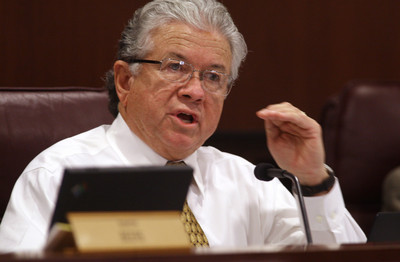Lawmaker again sounds alarm for new revenue sources
CARSON CITY -- Senate Taxation Committee Chairman Bob Coffin warned Tuesday that no business will be immune from tax increases if legislators decide the state needs additional revenue to cover essential program costs.
"We need to save our education system, human resources, programs for the elderly and the young," Coffin, D-Las Vegas, said in a speech before his committee held its first meeting of the 2009 Legislature.
"Everything is on the table," he added. "That is code that any tax that can be raised to balance this budget will be raised or considered -- mining, gaming, all industries are vulnerable to the necessities, the urgencies of balancing this budget."
Even two years ago when Republicans controlled the committee, Coffin was outspoken in the need to raise taxes to fund highway construction. At one meeting, he engaged in a verbal duel with Gov. Jim Gibbons over whether additional road taxes were needed. Coffin lost the fight.
In recent weeks, he has mentioned that legislators should consider taxing legal prostitution, escort services and strip club performances to raise revenue as the state suffers through its worst recession in generations.
"We don't hold back on this committee," added Coffin, noting he was returning as chairman after 18 years during which Republicans held control of the committee. "Welcome to the 2009 version of 'Let's Make A Deal.' "
But when Coffin asked the six other panel members to give views on tax matters, none made any comments.
Coffin said the Senate Finance Committee over the next two months will study state spending and programs and determine whether the budget prepared by Gibbons falls short of state needs.
Gibbons has proposed general fund spending of $6.17 billion, 9.3 percent less than the budget approved by the Legislature in 2007.
If any taxes are raised, Coffin said he wants a mechanism put in place that will have them expire on a certain date.
He noted that legislators in 2005 returned $300 million in excess revenue to citizens but added they did not give the money back to the businesses that absorbed tax increases in 2003.
Coffin said there have been previous recessions in Nevada, contending that one in the 1964-66 period "was every bit as bad as today."
"We need to take advantage of every opportunity we can to balance the budget," he said.
Almost immediately after Coffin's opening remarks, committee members mentioned how increasing the mining tax has become a popular topic.
Last year, the mining industry paid $30.7 million in net proceeds of minerals taxes on revenues of $5.4 billion. Most of that money comes from gold production.
Nevada mines produce 80 percent of the gold mined in the United States.
Sen. Terry Care, D-Las Vegas, said that there are "constitutional barricades" blocking the Legislature from increasing the state's net proceeds of minerals tax rate.
Because a 5 percent tax rate is in the constitution, the rate can't be increased without approval of the Legislature in 2009 and 2011 and an affirmative vote of the people in 2012. But under state law, the Legislature could reduce deductions the mining industry is allowed to take before calculating the 5 percent tax.
According to the Progressive Leadership Alliance of Nevada, mining would pay $141 million a year in net proceeds taxes if all deductions were withdrawn.
Coffin said he has received many e-mail messages from people with tax ideas.
"One idea predominates all discussions. Nobody wants to be taxed."
But he then reiterated that "no one is protected" from potential tax increases during the 2009 session, saying, "There are no sacred cows."
Las Vegas Review-Journal Capital Bureau Chief Ed Vogel at evogel@reviewjournal.com or 702-687-3901.
Bill expands police investigative powers
CARSON CITY -- A bill to expand investigative powers of police before they get a search warrant from a judge was challenged Tuesday as being too broad.
Deputy Washoe County Public Defender Orrin Johnson questioned wording of Senate Bill 51, sought by the Nevada Department of Public Safety, during a Senate Energy, Infrastructure and Transportation Committee hearing.
Johnson said the proposal raised constitutional concerns about unauthorized snooping, could lead to "fishing expeditions" by overzealous investigators and would undermine the authority of Nevada judges to tell police they're overstepping their bounds.
Under current law, police can subpoena a public utility to get the name and address of a person listed in utility records. SB51 would expand the information to include incoming and outgoing phone call records, power usage records, a person's birth date, Social Security or passport number, family contacts or "any additional identifying information" a utility might have.
Scott Jackson, chief of the state Division of Investigations, said the subpoenas would be issued in cases where there's "reasonable suspicion" of criminal activity. That's a lesser legal standard than the "probable cause" standard needed to get a search warrant from a judge.
Jackson said any of the information sought under SB51 would help in nabbing criminals. He noted that abnormally high power usage can indicate someone is using a lot of lights to grow marijuana in a house.
But Johnson said, "Allowing law enforcement officials to simply subpoena the information without limitation ... is an end run around the requirement to get a warrant before you search somebody's house."
Johnson said "the vast majority" of police investigators wouldn't go too far before getting a warrant. But he said overzealous investigators could violate the Constitution's Fourth Amendment protections against unreasonable search and seizure.
Sen. Mike Schneider, D-Las Vegas, the Senate committee chairman, said Johnson and Jackson, as well as utility representatives, should see if they can agree on amendments before the panel acts on the measure.
THE ASSOCIATED PRESS






















